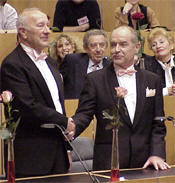
|
By Bob Minor Minor Details
No matter how tired and out-dated the old arguments seem to us, we continue to hear objections to same-sex marriage based upon the idea that "marriage" is for procreation. Yet because any person or any couple can raise a child, there's got to be more to this complaint than whether or not LGBT can raise children. And since those who are defining the debate define homosexuality exclusively and obsessively in terms of what "you people do in bed," not love, intimacy, commitment, and romance, what they really mean is that morally good sexual activity must potentially lead to procreation. No matter how we respond, no matter how often we point out the obvious -- that not all heterosexual couples do or can have children -- the right-wing and many others who still think in their terms need desperately to deny that same-sex genital activity can ever be life-giving or love-making. To picture same-sex sexual activity as something other than incomplete, unhealthy, and unfulfilling, might begin to open people up to the idea that gay sex is indeed fully human and intimate, not debased at all. So to make LGBT relationships and sex unappealing is a constant goal. The long history of religious support for the idea that the exclusive purpose of sexuality is baby-making, an idea now most often defended by the Vatican, still lingers as long as these arguments are raised against equal rights for LGBT people. The necessary potential of making a baby just remains a part of "straight" thinking about good sex. And denying birth control to women ensures that they will experience less pleasure in sex. Of course, the idea that good sex is exclusively for procreation isn't necessarily a part of natural, unconditioned heterosexual sex either. Heterosexuals think sex is fun and pleasurable too. They want more of it and want it more fulfilling.
 It's just that they are conditioned to act and think "straight." So, in
spite of how much heterosexual people don't live up to the ideal of
"straight" sex, they too are supposed to feel guilty and ashamed if they
are having fun sex.
It's just that they are conditioned to act and think "straight." So, in
spite of how much heterosexual people don't live up to the ideal of
"straight" sex, they too are supposed to feel guilty and ashamed if they
are having fun sex.
Straight women are expected to feel less than the ideal if they can't birth their own child. And straight men and women are supposed to feel that good sex takes place only in a marriage that can bring children into being even if they aren't having fun with their partner in the process. Few straight men are brought up to allow themselves to talk with their partners about what gives them pleasure in the sexual act. It's just not "manly." Few women feel they can talk to their husbands without it cracking a fragile male ego. So, they are left to fantasize about pleasurable sexual activity, they seek it in greener pastures elsewhere hoping that they won't have to talk about it with someone else either, and they may even feel guilty, ashamed, and angry about both having the desire for pleasurable sex and for failing to fulfil their desire. For anyone to believe that the purpose of sex is giving and receiving pleasure is to break free of this straightjacket. And the out and open existence of LGBT people disrupts the straight pattern because LGBT people are understood to embody sex for no other reason than pleasure. This does, as the Gay Liberation Front pointed out decades ago, disrupt the dysfunction of a culture that is deeply sexually ill. Of course, there are many reasons to have sex. To create another life is one. To express closeness with or commitment to another human being we love is another. But whatever else it is, sex is also fun, pleasurable, playful, and free. Yet in the midst of a culture that basically uses sex to generate consumers, to say it out loud is not a "straight" thing to do. If you think it is, just start your next conversation with your friends with: "I really like sex." Watch how they react and where the conversation goes. So, how can we break out of this cultural sickness? How can we say that sex is fun, and good, and an important element of our closest relationships, something we cherish with those we cherish? Since we are already out as people who have sex for pleasure, since we already claim no longer to be "straight," it ought to be easy. The problem is that we too internalize the messages of the straight culture around us about what morally good sex is. And by the lingering dominant definition, we can never have it. We know that the culture around us still hates to think about us having good sex. And we live in the shame of that, trying to cover our own nakedness with what looks like little more than the fig leaves that Eve and Adam wore in that ancient garden. We don't want straight people to think we find pleasure in sex even if it's with a committed partner. Through our own acts of shame we politically play it down as much as possible and thereby communicate to the broader culture that we are ashamed of being sexual beings: "I just happen to be gay." "I'm just like you." "Look, we're not just defined by what we do in our bedrooms." Or, to take a phrase from the Christian Gospels and make it negative: "We don't want to be known by the people we love." And the dominant culture smiles at our shame. Instead of being pioneers in cultural healing around sex, we buy into, support, and collude with the cultural sickness. So, like the dominant culture, our sexual acts become more of an obsession, a forbidden desire, and less an intimate, human activity that has an important place in the scheme of things. It's our decision. Do we really want our sex to be "straight-acting"? Do we really think the sexual model of our dominant culture is healthy? Or do we want to live on our terms for us with those we love?...And celebrate pleasure in the process.  Robert N. Minor, Ph.D. is the author of Scared Straight: Why It's So Hard
to Accept Gay People and Why It's So Hard to Be Human (HumanityWorks!,
2001) and Professor of Religious Studies at the University of Kansas. He
was a member of the Values Panel for the Kansas City Star's nationally
award winning "Raising Kansas City Project" which was concerned with the
values we teach the next generation. He may be reached at Minor@libertypress.net.
Robert N. Minor, Ph.D. is the author of Scared Straight: Why It's So Hard
to Accept Gay People and Why It's So Hard to Be Human (HumanityWorks!,
2001) and Professor of Religious Studies at the University of Kansas. He
was a member of the Values Panel for the Kansas City Star's nationally
award winning "Raising Kansas City Project" which was concerned with the
values we teach the next generation. He may be reached at Minor@libertypress.net.
|
|
© 1997-2002 BEI
The sexual orientation of individuals pictured in and writers for
Gay Today should not be assumed.
 "Public arguments against homosexuality are influenced by negative
attitudes toward sex that is only an act of intimacy and pleasure." That's
what Pepper Schwartz and Virginia Rutter pointed out again at the end of
the twentieth-century in their 1998 book, The Gender of Sexuality.
"Public arguments against homosexuality are influenced by negative
attitudes toward sex that is only an act of intimacy and pleasure." That's
what Pepper Schwartz and Virginia Rutter pointed out again at the end of
the twentieth-century in their 1998 book, The Gender of Sexuality.